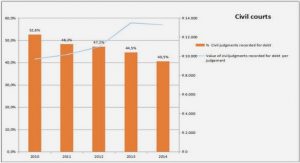Get Complete Project Material File(s) Now! »
Context of the research to be undertaken
Management teams as studied in this project, encompass the school principals, the deputy or assistant principals and heads of the departments. Management teams have been investigated in relation to their responsibilities and activities as leaders in the schools. Thus their management skills have been highlighted with the aim of formulating a foundation for empowerment.
The Task Team (1996:8) regards education management development as the key to transformation in education. This implies that meaningful change in education calls for strong and creative leadership.
Capacity building is one form of empowerment, which is viewed as an effective tool towards leadership emancipation. In supplementing the idea Campbell (1983:x) states that competent administrative leadership is crucial to the perpetuation of the democratic way of life.
Why is this a study in Education Management?
This investigation falls within the scope of Education Management. The problems identified and placed under the microscopic eye of the researcher emanate from the field of education management and the terms and concepts used in the study are also embedded in this field.
Since the investigation explores the empowerment nature and activities of the management teams, this implies that the solutions which have been suggested for the particular problems as well as the particular generalisations and conclusions arrived at, are of an education management nature.
Demarcation of the field of study
The study focuses on the management teams’ empowerment at secondary schools. The teams’ activities have been observed in relation to their duties and responsibilities. Each team’s uniqueness, as well as the uniqueness of the individual members of the team, was considered. The team’s influence on its environment and the reciprocal influence of the environment upon the team was also perceived. Hargreaves and Hopkins (1991:8) observe that schools are complex organisations embedded in a disorder~y-environment of multiple and often conflicting pressures and expectations.
The study, in addition to a study of relevant literature, has embarked on an emperical investigation that was undertaken at secondary schools in the Sehukhune area. This area which was earmarked and demarcated for investigation is situated in the Northern Province. The Northern Province is predominantly rural and poor. Most secondary schools in the area are plagued by mismanagement and managerial problems, as most educational leaders and management teams have undergone a little or no training in management. This is also borne out by the poor matric results in this area.
The Sekhukhune area is also known as the Southern region or region six, and it contains 679 primary and secondary schools. These schools are evenly distributed amongst the six area offices or circuits. The circuits act as the mediators between the schools and the regional office. Each circuit has its own management staff including area managers.
Thus most decisions in the area are still being taken at a regional level.
Aims of this investigation
This research project aims at creating a model, which will serve as the frame of reference for the empowerment of management teams at secondary schools, especially in the Sekhukhune area. The model will therefore entail those important managerial skills, which will enable the management teams to be effective and efficient in the midst of all the forces that drive and change education.
Furthermore the study aims at encouraging proactive actions that will enable the management teams to create and pursue various visions purposefully. Strategies that are of importance in enabling management teams to succeed in their endeavours will be highlighted. Clark (1994:5) is of the opinion that many organisations still appear to operate on the assumption that the act of promotion, together with the minimum of management training, is enough to equip managers with the skills to be both effective leaders and members of management teams.
CHAPTER 1 BRIEF OUTLINES OF THE RESEARCH, ORIENTATION AND OBJECTIVES.
1.1 INTRODUCTION
1.2 ORIENTATION
1.3 PROBLEM STATEMENT
1.4 AIMS AND OBJECTIVES OF THE RESEARCH
1.5 RESEARCH METHODS
1.6 CLARIFICATION OF CONCEPTS
1.7 THE STRUCTURE OF THE RESEARCH
1.8 CONCLUSION
CHAPTER 2 PERSPECTIVES ON TEAM-MANAGEMENT STRATEGIES
2.1 INTRODUCTION
2.2 TRADITIONAL MODE OF SHARED RESPONSiBILITY
2.3 ONE-TO-ONE MANAGEMENT STRATEGy
2.4 ONE-TO-GROUP MANAGEMENT STRATEGY
2.5 THE MODERN STRATEGY OF PARTICIPATORY LEADERSHIP
2.6 TEAM MANAGEMENT STRATEGIES THAT HAVE TO BE FULFILLED BY THE SCHOOL PRINCiPAL
2.7 CONCLUSION
CHAPTER 3 CAPACITY-BUILDING FOR MANAGEMENT TEAMS IN SCHOOLS
3.1 INTRODUCTION
3.2 EMPOWERMENT OF MANAGEMENT TEAMS
3.3 CONCLUSION
CHAPTER 4 THE EMPIRICAL INVESTIGATION INTO THE EMPOWERMENT of MANAGEMENT TEAMS IN THE SEKHUKHUNE AREA
4.1 INTRODUCTION
4.2 PERSPECTIVE OF THE RESEARCH AREA
4.3 THE RESEARCH METHODOLOGY
4.4 THE QUESTIONNAIRE
4.5 THE RESEARCH SAMPLE
4.6 STATISTICAL ANALYSIS AND INTERPRETATION OF DATA
4.7 CONCLUSION
CHAPTER 5 GUIDELINES FOR A SUCCESSFUL CAPACITY-BUILDING PROGRAM FOR MANAGEMENT TEAMS AT SECONDARY SCHOOLS
5.1 INTRODUCTION
5.2 FACTORS WHICH DETERMINE A SUCCESSFUL CAPACITY· BUILDING PROGRAM
5.3 CAPACITY ·BU ILDING PROGRAM
5.4 CONCLUSION
CHAPTER 6 OVERVIEW, CONCLUSIONS AND MOTIVATED RECOMMENDATIONS
6.1 INTRODUCTION
6.2 OVERVIEW OF THE STUDY
6.3 FINDINGS
6.4 CONCLUSION
6.5 PROBLEM-SOLVING STATEMENTS
6.6 RECOMMENDATIONS
6.7 LIMITATIONS OF THE STUDY
6.8 AREAS FOR FURTHER INVESTIGATION
6.9 ACHIEVEMENT OF GOALS
6.10 CONCLUSION
BIBLIOGRAPHY






